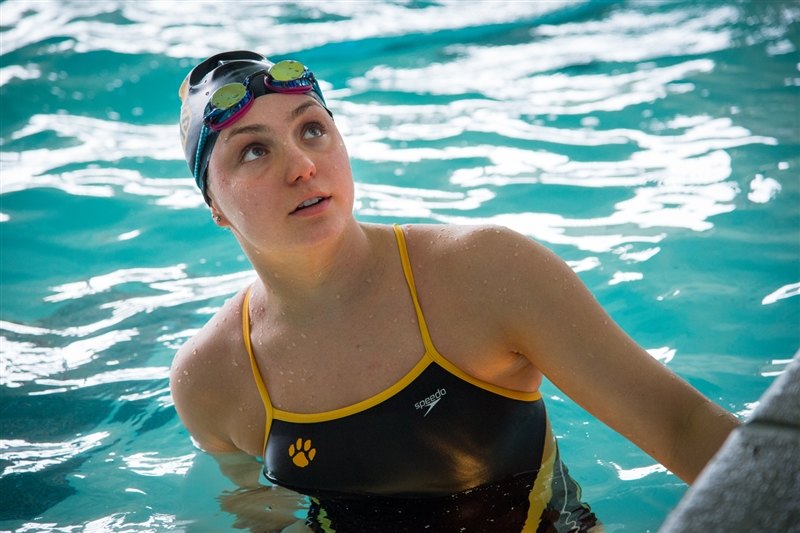One of the many wonderful things about attending Lick-Wilmerding is that you have your choice of sports. Soccer, basketball, baseball, swimming, tennis, badminton, flag football, ultimate Frisbee, dance, track/cross-country, volleyball, lacrosse and wrestling are all proudly (and fiercely) represented. We are lucky enough to have the facilities and the coaches who bring all these sports to LWHS, and we Tigers do not take this lightly. It is estimated that in a student population of 478, about 408 participate throughout the sports seasons, the ratio of sports coaches to teachers is an estimated 55 coaches to 63 academic teachers. The school fields 20 varsity teams total.
I interviewed eight Lick students for a two-part article, students who, as so many others, have dedicated a large part of their lives to sports. My goal was to examine what kinds of effects such dedication can have on school life, and how these students have managed to balance their lives.
“There are times where I need to clear my head, even if I’m just outside playing basketball or football with friends or if I’m out there working by myself. There’s always just something about basketball that clears my mind and I’m able to focus on anything I put my mind to afterwards. I really need it.” Joshua Caldwell ’18 splits his time juggling football, basketball and school, but it’s clear that basketball is really where his heart lies. He’s been playing since he was four. For Caldwell, basketball is “something that me my dad and my brother bond over…My younger brother’s goal is to beat his older brother, [laughs] I don’t let him.” When his family comes to watch his games he says, “My mom is always screaming my name and my dad is just relaxing in the background…They are both really supportive of me. They want me to keep working on it because they know how much sports has had a big impact on my life.”

At Lick, Josh plays on the Frosh/Soph Team. Off campus, he plays club basketball with the Oakland Rebels. Last July the Rebels went to Oregon for a tournament. The tournament is an example of an aspect of playing that Caldwell most enjoys, having to think quickly on the spot and playing against teams he isn’t familiar with. “There were new teams I had never seen before, different styles of playing. I had to figure out what their strengths and what their weaknesses were during the game…You are always going to go up against somebody who is better than you, so its about dealing with the pressure of somebody being better than you and just holding your own. It’s very challenging but at the same time, very fun.” Since Caldwell plays four days during the week for five hours and with tournaments on the weekends, juggling school work is always a challenge. However, he is surrounded by coaches who understand the position he is in. One of the best pieces of advice he has ever gotten is from his middle school coach, Coach Burns, who told him, “You are a scholar athlete and scholar comes first.” If Caldwell has to miss a practice, his coaches understand.
Caldwell spends a lot of time with his teammates and he reflects that, “We are very close to each other but at the same time we are each other’s biggest rivals.” Caldwell doesn’t have a problem with the competition that arises, but some people on his team do. The attitude of his team is very much, “You may be my friend now but when we are playing all that gets thrown out the window, we are trying to be the best.” When Caldwell thinks to the future, it’s clear that sports will be in it. “I’ve really thought about this, I want to carry it through my entire life, at least an aspect of it. If I’m not playing, I’ll be coaching. If I’m not coaching I will be refereeing or starting a program to help kids work with it, that goes for both basketball and football. [I want to play sports] as long as I can, most likely that will be my whole life.”
Swimming is something that comes naturally to Aidan Lisker ’16. At age seven when she and her father were practicing swimming strokes in the pool, a coach from the swim team came over and asked Lisker to join. Lisker describes, “the rest is history.” She goes to meets every couple of months and she swims for the Olympic Club team and for the LWHS swim team.
Lisker has had to give up many non-swimming activities. She can’t go out on Friday nights, and swim meets have often interfered with vacations and family events. For her, because she loves the Lick team so much, it makes having to miss out on so much worth it. The possibility that you can always do better is something that drives her to keep going. In competitive swimming, “I’ve grown up racing against the same people my entire life. I am driven partly by knowing that [her competitors] are getting faster and they are improving and I want to keep up with them.” Laughing, Lisker admits that, “yes, I’m very competitive.”

Although swimming has been a positive force in her life, last year was a particularly rough year for Lisker. “I didn’t make NCS because I was 41st and they only take the top 40. I missed placing by one one- hundredth of a second.” Lisker had chosen to focus more on academics that year, which she thinks may have been the reason that she fell behind some of her friends. Trying to balance swimming and school is extremely hard, but in other ways swimming has actually strengthened her as a student. “Swimming has always helped me tremendously with time management. I understand that I have a very set amount of time that I will be able to do this homework and if I don’t get it done then I wont’ be able to succeed at school. My schedule doesn’t leave a whole lot of room for distraction.”
Living with that strict of a schedule may not seem worth it to some. One event in particular stood out to her as how she finds a way to keep going. Freshman year, “everybody knew that my best event was 100 breast…. During the 100 breast, the entire team was right over my lane, and every time I turned they were right in my face. I didn’t feel anything, no pain and I won the event.” She broke a time she had been trying to break for a long time and she got to share that with her team. “Those are the kind of moments that make all the hard work worth it.”
Nate Joseph ’17 started playing soccer at the age of five with his kindergarten classmates; now he practices two to three times a week and plays games on Saturdays and Sundays. As a child, soccer was a way to hang out with other children in his kindergarten. Joseph’s dad was the soccer coach and Joseph remembers the games being, “about my friends and just going out and having fun. My team was like a dynasty and we were together till third grade. We didn’t lose a game. That was the most fun time of my soccer career.” Four years later Joseph was playing at a competitive level, and that’s when he had to start sacrificing his time. Every weekend he continues to go to games instead of hanging out with friends. The little time that’s left over is spent on homework. Soccer has forced him to become more disciplined with schoolwork; if he wants to keep up with his team, procrastination isn’t something Joseph can afford.

Joseph’s goals as a kid were “to be on the same level as the kids around me. Over time it became to push past the kids around me.” Ten years after his first soccer game he has quite a different perspective on where soccer is going to take him. He wants to play in college and he hopes that the dedication he has shown towards the sport will help him after college as well.
Even though he has had to give up so much of his time, soccer has become such an integral part of his routine that if, “I haven’t played, it throws my whole routine off….I’ve been doing it for so long that it’s easy to keep going.” Joseph cites two things as motivation. “I like the competition. I’m a really competitive person, so I really don’t like losing, whether it’s getting a worse grade than my friend at school or losing in a drill at practice. A second reason is the enjoyment I get out of it. I can’t imagine my life without soccer. I want to keep pushing with it and going farther with it.” His club team, Marin FC, went to Nationals in Greensboro, North Carolina last summer.
For these students, sacrifice has been a necessary part of pursuing what they love. Each has had to learn how to use their time most effectively and stay disciplined with homework. In some ways it’s a tradeoff. They work incredibly hard but they also gain skills that will continue to help them well past their athletic years.
This article will be continued in the may pt issue






